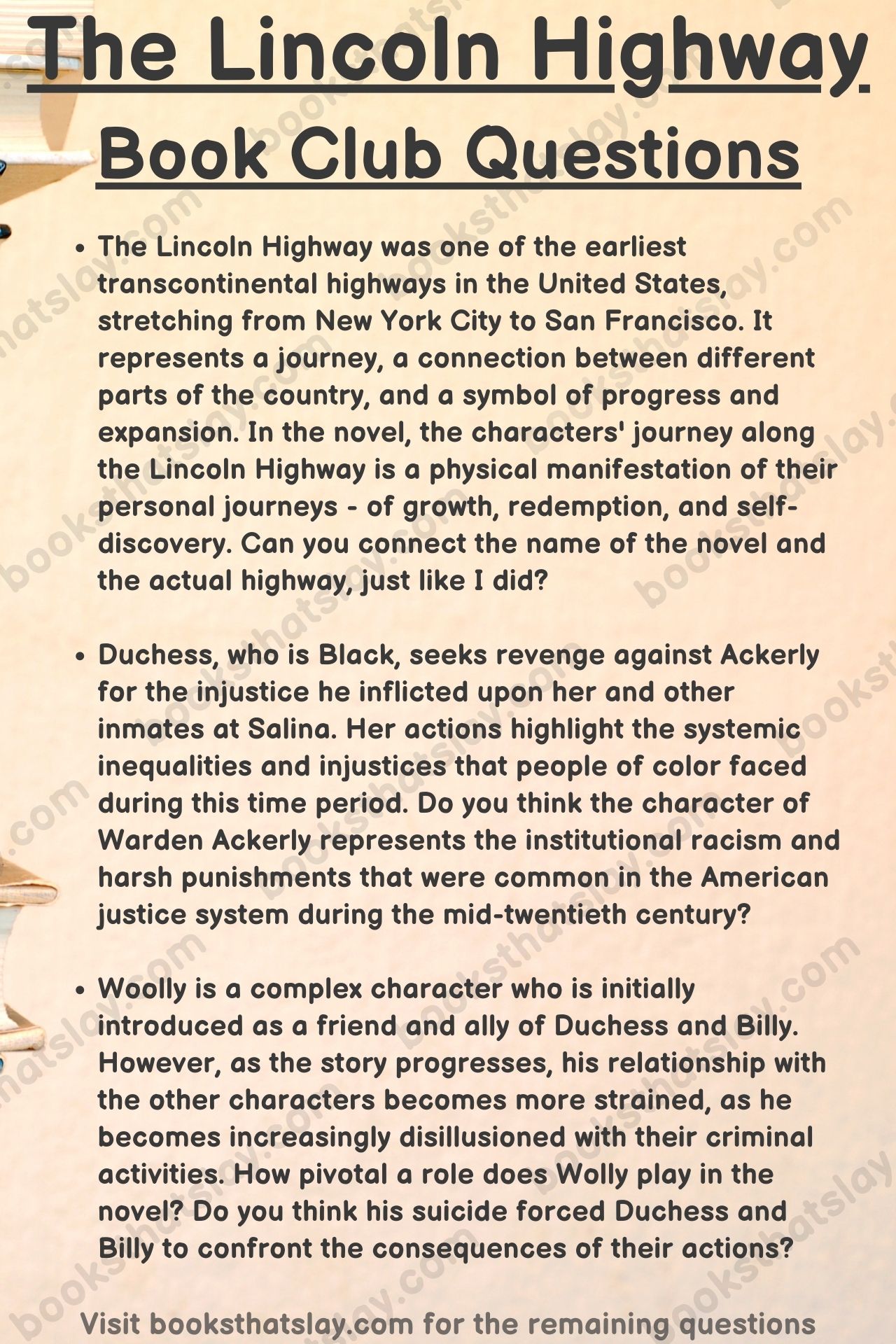10 The Lincoln Highway Book Club Questions
Craving a story that blends redemption, brotherly bonds, and surprising twists? Buckle up for Amor Towles’ novel, The Lincoln Highway.
This fast-paced adventure rockets us across 1954 America in just ten days. We join 18-year-old Emmett Watson and his younger brother as they ditch their troubled past for a California dream.
But their escape takes a wild detour when two enigmatic companions join the ride.
Packed with unforgettable characters and diverse perspectives, The Lincoln Highway is a goldmine for book club discussions.
Dive deep into the themes, explore the vibrant settings, and get inside the mind of this master storyteller.
Let’s get started with these thought-provoking book club questions!
Also Read: The Lincoln Highway Book Review.

The Lincoln Highway Book Club Questions
- The Lincoln Highway was one of the earliest transcontinental highways in the United States, stretching from New York City to San Francisco. It represents a journey, a connection between different parts of the country, and a symbol of progress and expansion. In the novel, the characters’ journey along the Lincoln Highway is a physical manifestation of their personal journeys – of growth, redemption, and self-discovery. Can you connect the title of the novel and the actual highway, just like I did?
- The Lincoln Highway includes depictions of violence and other sensitive topics. Amor Towles handles these topics in a nuanced manner while also not shying away from the harsh realities of the characters’ experiences. The depictions of violence and abuse are never gratuitous or glorified but rather serve to highlight the brutality and injustice of certain situations. The suicide of a main character with a disability is depicted in a way that is both tragic and empathetic, raising important questions about the treatment and rights of people with disabilities. Discuss.
- Emmett starts off as a responsible and determined young man who wants to start a new life with his brother after his father’s death. However, he is pulled into a dangerous situation when Duchess and Woolly ask him to drive them to New York to steal money. Throughout the story, Emmett faces numerous challenges but remains steadfast in his determination to protect his younger brother Billy and make a better life for them. What is your take on Emmett as a character in The Lincoln Highway? Do you think he evolves throughout the novel, or is he just another stagnant criminal who refuses to change?
- He is neurodivergent and exhibits features of developmental disabilities, as well as psychological disturbances. His desire to steal the money from his family’s camp in the Adirondacks sets the story in motion, and his presence creates tension and conflict between the other characters. Despite his unpredictable behavior, this person also has moments of tenderness, such as when he visits his sister in the most popular city in the world. Guess which character I am talking about? Do you think this person serves as a catalyst for much of the story’s action and helps move it forward? Why or why not?
- The relationship between Emmett and Billy is central to the story, as they rely on each other throughout their journey to New York. Emmett is fiercely protective of Billy and does everything he can to ensure his safety and well-being, even when it means putting himself in danger. Billy, in turn, looks up to Emmett and trusts him implicitly. Their bond is tested throughout the story, particularly when they are separated on the train, and Billy has a close call with Pastor John. Do you think such siblinghood is necessary in life? Do you have an equally loving sibling in your life? If not, do you crave one?
- Duchess, who is Black, seeks revenge against Ackerly for the injustice he inflicted upon her and other inmates at Salina. Her actions highlight the systemic inequalities and injustices that people of color faced during this time period. Do you think the character of Warden Ackerly represents the institutional racism and harsh punishments that were common in the American justice system during the mid-twentieth century?
- Duchess is motivated to exact revenge on his father for framing him for a crime he did not commit, which led to his incarceration in Salina. This has a profound effect on his relationships with others, as he is consumed with bitterness and anger toward his father. He is unable to trust others, including his closest friends, and this leads him to manipulate and betray them in order to achieve his goals. Do you agree?
- Woolly is a complex character who is initially introduced as a friend and ally of Duchess and Billy. However, as the story progresses, his relationship with the other characters becomes more strained, as he becomes increasingly disillusioned with their criminal activities. How pivotal a role does Woolly play in the novel? Do you think his suicide forced Duchess and Billy to confront the consequences of their actions?
- Emmett was motivated to interfere with Duchess’s plan to harm Ackerly because he wanted to protect his own reputation and avoid getting involved in any illegal activities. Emmett had just retrieved his newly painted car and was planning to drive to the east coast with Sally to start a new life. He did not want to be implicated in any crimes and risk losing his chance at a fresh start. Discuss.
- Billy proves his intelligence and resourcefulness in the story by deducing that Duchess cannot read and, therefore, cannot know that the rifles in the house have no firing pins. He also deduces the safe combination from his knowledge of American history and his understanding of Woolly’s family’s connection to that era. Do you find any other scenarios in the story where Billy had to prove his intelligence and resourcefulness?
If you liked this set of questions, here are a few other options you can consider.